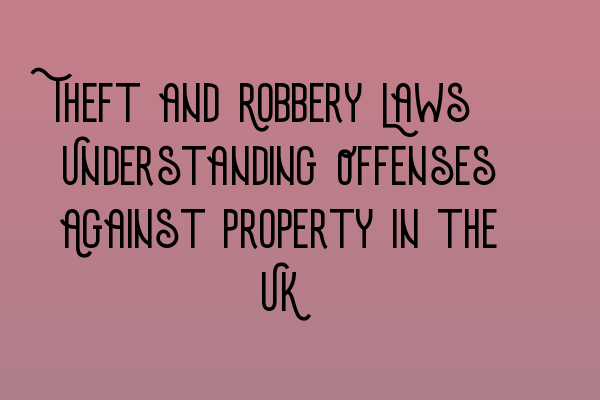Theft and Robbery Laws: Understanding Offenses Against Property in the UK
Welcome to the SQE Criminal Law & Practice Law UK blog! In this post, we will delve into the intricacies of theft and robbery laws in the UK. It is important for individuals, legal practitioners, and aspiring solicitors to have a comprehensive understanding of these offenses against property.
What is Theft?
Theft is a criminal offense defined in Section 1 of the Theft Act 1968. It involves the dishonest appropriation of property belonging to another with the intention to permanently deprive the owner of it. It is crucial to recognize the key elements of theft to identify and convict offenders. To learn more about theft and other criminal offenses, you may want to explore our SQE 1 Practice Exam Questions and SQE 1 Practice Mocks FLK1 FLK2 articles.
Understanding Robbery
Robbery is a more serious offense compared to theft and involves the use or threat of force to commit theft. It is categorized as a specific form of theft and is governed by Section 8 of the Theft Act 1968. Our SQE 2 Preparation Courses can provide you with detailed insights into the different aspects of robbery.
Elements of Theft and Robbery
To prove a theft or robbery offense, certain elements need to be established. These elements include:
- Appropriation of property
- Property belonging to another
- Dishonesty
- Intention to permanently deprive the owner (in case of theft)
- Use or threat of force (in case of robbery)
Each element plays a crucial role in the prosecution of theft and robbery cases. It is essential to understand these elements thoroughly to build a strong defense or a compelling case against a perpetrator.
Penalties for Theft and Robbery
In the UK, the penalties for theft and robbery vary based on the severity of the offense. For theft, it ranges from fines to imprisonment up to seven years. Robbery, being an aggravated form of theft, carries more severe penalties, including imprisonment for a term of life. The court takes various factors into account, such as the value of the stolen property, the level of violence used, and the defendant’s criminal history.
For detailed information on the penalties and sentencing guidelines for theft and robbery offenses, our SQE 1 Preparation Courses can provide a comprehensive understanding.
Conclusion
Understanding theft and robbery laws is crucial for legal professionals and individuals involved in criminal law. By grasping the key elements and penalties associated with these offenses, one can work towards justice and protect the rights of victims.
If you are preparing for the SQE exams, it is essential to have a solid understanding of criminal law and practice. Our SRA SQE Exam Dates article can help you plan your study schedule effectively.
